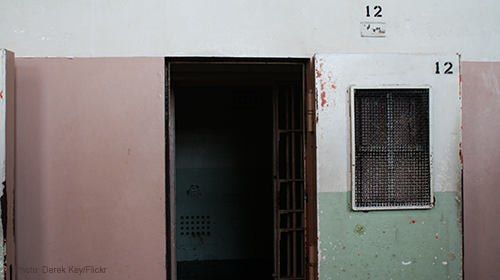
February is cold in Northern Virginia. It's even colder when you're in a cell alone, without a mattress, a blanket, a pillow, or a sheet.
When I walked into that cell in the basement of the Fairfax County Jail, my hands cuffed behind my back and stomach grumbling from a half a day without food, I was almost relieved. Happy to be soon free from cuffs, to be close to being processed, and to be moved to wherever I'd suffer next. What I didn't know is that once the deputy uncuffed me and closed the small opening that I'd slipped my hands through, no one would talk to me again for days.
This was February 21, 1997. Seventeen years ago and still the date, the time of day I arrived, and the exact location of the cell in solitary confinement are permanent fixtures in my memory. I was sixteen years old and being held in pre-trial detention on carjacking and robbery charges.
After spending three months in juvenile facilities, I had grown strangely familiar with being in a cell. But nothing prepares you for solitary confinement.
I spent ten days in that cell. I learned to pace, seven steps back and forth, again and again. I stared at the wall, sought out figures in the cracks. Across from me was the padded room where they sent prisoners who threw things on the deputies. The kid in the cell beside me, he too only sixteen or seventeen years old, told me about all of his fears of a straightjacket. Those days felt like a straightjacket to me.
Eight of those days were without a shower or any of the other small allowances that helped men from freezing in the night. I wore the same clothes and slept on a concrete slab that was covered in phlegm. For a time I told myself that the ordeal couldn't be real. I wondered if one of the punishments for guilt was solitary. How would I know otherwise? I hadn't been to court, hadn't seen my lawyer in a few weeks, had yet to have a trial – and yet, without explanation I was in solitary confinement.
After those first ten days in solitary, I would go on to plead guilty to carjacking and robbery. Sentenced to eight years in prison, the better part of my youth was spent confined. And during those eight years, I spent a year and a half doing various short stints in solitary confinement. I watched grown men crack under the pressure of a solitary cell. I watched men beg for relief, strapped to a bed by their arms and legs.
Seventeen years later, I find that I'm again constantly thinking about solitary confinement. The horror stories that drive the public conversation about solitary are not stories to me, but memories. It's unsettling because as much as I know the truth of what the noise of silence can do to a person's mind, I know the dangers for juveniles are worse.
It's good to see this issue getting more press. And it's encouraging to see some states slowly making changes. But it's still unacceptable that every day children are held in solitary confinement for upwards of 22 hours — in adult prisons and jails and juvenile facilities alike. It's unacceptable that we still have a practice on the books that devastates children's minds. We know that solitary confinement does not reduce violence and likely increases recidivism, and we must end this child abuse nationwide.
To help address the widespread issue of solitary confinement and isolation in juvenile facilities, check out the ACLU's new advocacy toolkit, "Ending the Solitary Confinement of Youth in Juvenile Detention and Correctional Facilities."
Learn more about juvenile solitary confinement and other civil liberties issues: Sign up for breaking news alerts, follow us on Twitter, and like us on Facebook.

